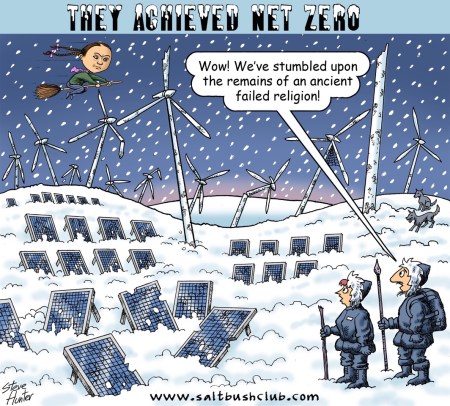Will Eurocrats Give Up Their ‘Net Zero’ Fantasy?

National governments are in gradual retreat from their “hard promises” to wean their economies off ‘fossil fuels’, according to a new report
Since the 2010s the failures of ‘green’ technologies to become economically viable have prompted nations to dilute or postpone established environmental targets, says British journalist Ross Clark in “The Retreat from Net Zero,” commissioned by research group Net Zero Watch.
Noting that non-Western governments are moving away from ‘decarbonization’ policies in order to protect their economies (and, one could guess, their positions in power), the report also highlights the importance of national interests being asserted in a geopolitical scene that is no longer unipolar.
Even the EU faces an agrarian backlash against its destructive ecological regulations.
Scathingly, Clark predicts more political fallout for advocates of the ‘green’ transition:
They have expended so much political capital on this, and have created so many client jobs, quangos [semi-public administrative bodies receiving government funding], agencies etc involved in pushing for net zero, that none are going to be able to come forward in the near future and say we made a big error.
Alongside the many dubious investments in low-power infrastructure and pointless administration, the authorities worldwide are heavily invested in this political vision, and unlikely to want to admit having been wrong without a fight.
Clark’s report contrasts the misplaced enthusiasm of Western governments to the growing indifference of petrostates on green issues, as seen at the recent COP summit.
The Green Revolution’s underperformance is shown throughout his multiple case studies. Hydrogen production needs ‘fossil fuels’—meaning it fails to cut emissions.
Boris Johnson promised to make the UK into “the Saudi Arabia of wind,” but this turned out to be hot air.
Typical of the dysfunctionality of the new ‘green’ economy is electric car sales, which plateaued after an “initial rush of enthusiasm from early adopters” and a reduction in subsidies.
UK sales of new EVs dropped 17% in 2022, despite a 9.5 percent rise in car sales generally, a parallel trend across the EU. Meanwhile, heat pumps and solar panels both face cost barriers despite heavy public subsidies.
While the green transition led governments and investment firms to promise employment and financial rewards, the reality is that the model is fundamentally unrealistic.
External factors—such as the risk of supply chain disruption in the Red Sea or tariff wars involving the United States, EU, and China—can’t excuse the catastrophic human and economic impact of moving to a ‘green’ economy.
According to Clark,
[Last week’s] farmers’ protests in Europe have set the tone. Governments have fooled themselves into thinking there is massive popular support for net zero, on the basis that opinion polls show general support.
But when it comes down to the real effects on people’s lives and wealth, support rapidly drains away—indeed we get mass anger.
The report concludes that 2024 marks a challenging year for the ‘green’ transition as the “cost implications of a net zero strategy on ordinary households are becoming clearer,” with the recent spike in energy prices compounded by Russia’s invasion of Ukraine rapidly undermining Germany’s political and economic stability.
Clark’s observations are vindicated by the news that Europe’s entire solar panel industry faces obliteration due to high costs and competition from China, as Brussels’ ‘carbon’ tariffs threaten to tear apart the WTO trading order in a dispute with the Global South.
While the many failings of the ‘green’ transition as articulated by the report are becoming clearer by the day, it is still uncertain whether Western elites are willing to give up on their policies.
See more here climatechangedispatch
Please Donate Below To Support Our Ongoing Work To Defend The Scientific Method
PRINCIPIA SCIENTIFIC INTERNATIONAL, legally registered in the UK as a company  incorporated for charitable purposes. Head Office: 27 Old Gloucester Street, London WC1N 3AX.
incorporated for charitable purposes. Head Office: 27 Old Gloucester Street, London WC1N 3AX.
Trackback from your site.

Ian Lowe
| #
While I drive an EV, I’m no supporter of man made climate change, if it truly is changing, I believe it’s simply through natural causes. However, looking at predictions for oil production, it seems that best estimates give oil around another 50 years or so. Whether 50, 60 or 70 years, it WILL run out one day. Isn’t it better to develop alternatives now, rather than leave it until the 11th hour. Of course, before the oil does run out, new, better alternatives may well (probably will) come along but if EV’s are developed and ready to take over, at least the world won’t grind to a halt.
Reply
Francois Stallbom
| #
Oil will never run out as it is produces every day.
Reply